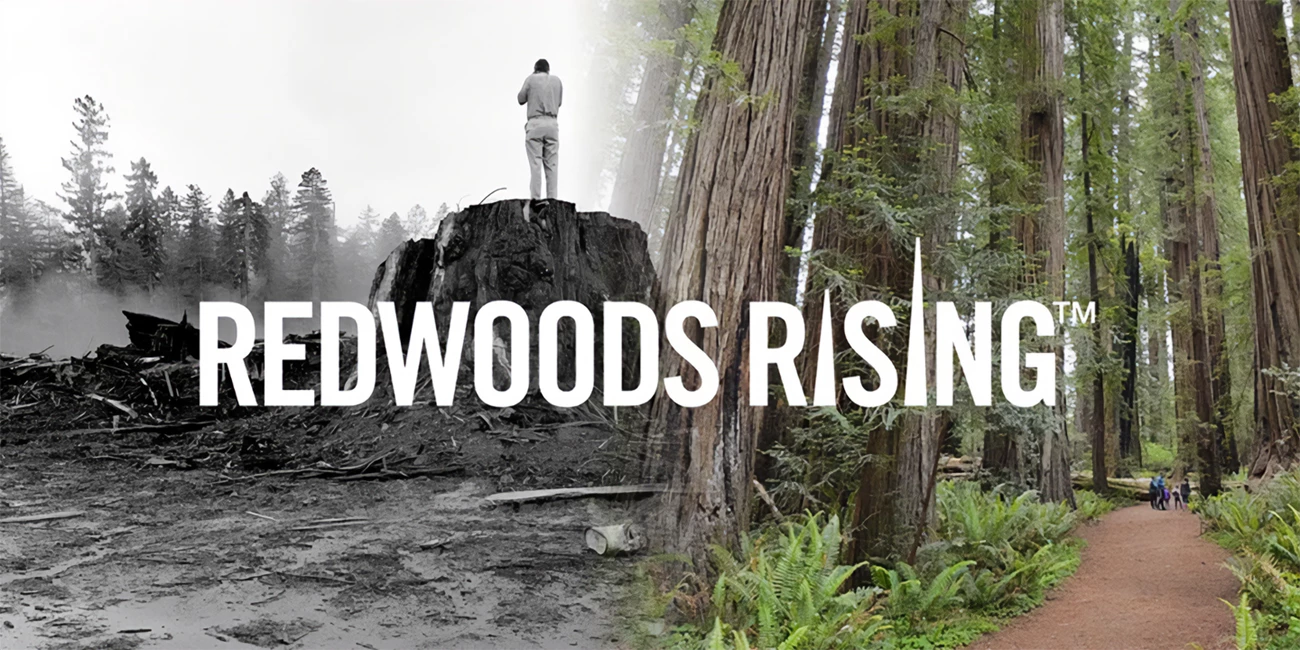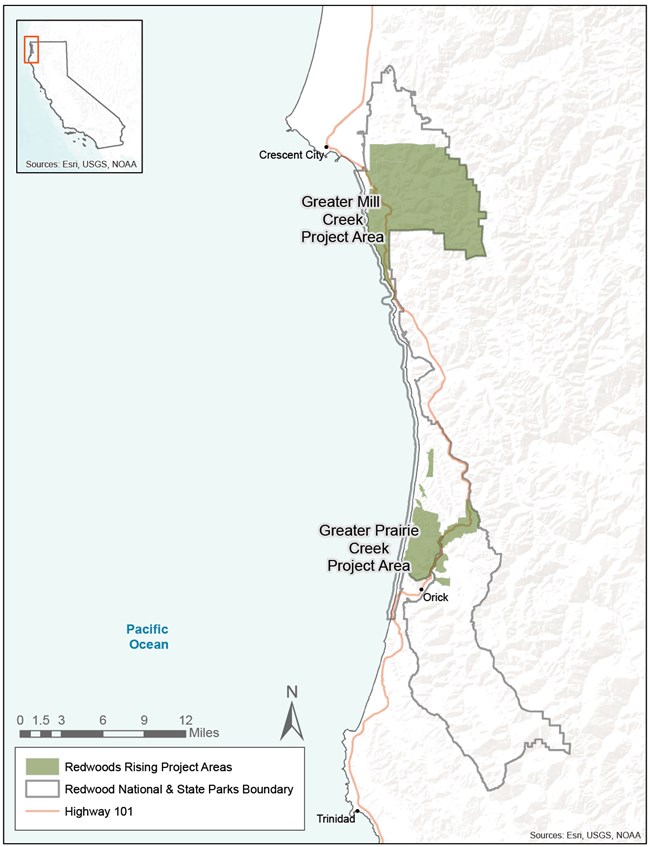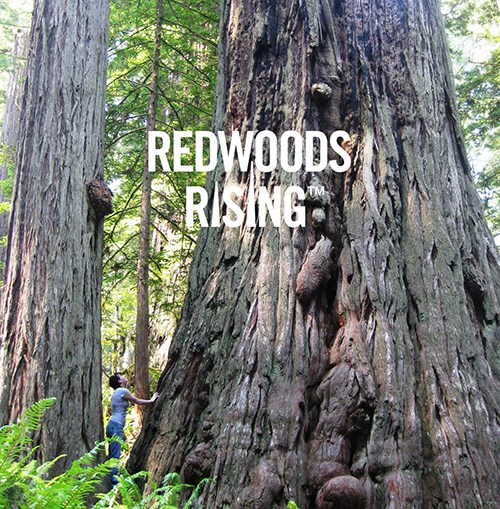
Dave Van De Mark, John Chao, NPS Restoring Our Forests: The Vision of Redwoods RisingRedwoods Rising, formalized in April 2018, is a collaborative and ambitious restoration initiative involving Save the Redwoods League, the National Park Service, and California State Parks. This partnership aims to implement a large-scale restoration effort across 120,000 acres of forests in Redwood National and State Parks (RNSP). The initiative focuses on improving forest and watershed conditions to restore the health and resilience of these iconic landscapes, ensuring the long-term preservation and vitality of the redwood ecosystem. 
Redwoods Rising. The Mission of Redwoods RisingThe mission of Redwoods Rising is to protect old-growth stands, restore redwood forest ecosystems, and ensure the long-term health of these lands. Together with redwood enthusiasts, park visitors, local communities, and tribes, we seek to increase support, knowledge, and appreciation of the iconic and unique California redwood forest landscape. Our vision of Redwoods Rising is that the 120,000 acres of redwood forest ecosystems in RN exists as a connected and thriving landscape that supports and protects the parks' natural and cultural treasures. This restoration effort will involve forest and vegetation management, failing and inaccessible logging road removal and maintenance, cultural site protection, watershed management, as well as reducing the amounts of erosion and sediment going into rivers and streams.
Lands, Watersheds, and Ecosystems to be Restored and ReconnectedThis ambitious initiative aims to enhance the health and connectivity of these vital ecosystems, addressing challenges such as habitat fragmentation, water quality, and biodiversity loss. By restoring these landscapes, we not only protect the incredible wildlife that inhabits them but also ensure a thriving environment for future generations to enjoy and appreciate. The work being done here represents a commitment to conservation, aiming to reconnect the land and its ecosystems for a more sustainable and resilient future. Collectively:
Specifically:
Redwoods Rising Accomplishments from 2020-2024Restoration Metrics:
Overall Project Goals:
First Areas to be Addressed:
Early 2020 - Early 2022 Accomplishments:
These efforts represent significant progress towards the long-term vision of restoring and enhancing the health of the redwood forest ecosystems. 
Map and Location of Restoration AreasThe Greater Mill Creek (GMC) Watershed is situated in the northern part of Redwood National and State Parks, located south and southeast of Crescent City. The restoration efforts in this area primarily take place within Del Norte Coast Redwoods State Park. The Greater Prairie Creek (GPC) Watershed is located in the southern section of Redwood National and State Parks, to the north and northwest of Orick. The GPC project area spans both Redwood National Park and Prairie Creek Redwoods State Park. These watersheds are critical for the overall health of the redwood ecosystem and are focal points for ongoing restoration initiatives aimed at improving forest and watershed conditions. 
Save the Redwoods League Summary of the CollaborativeRedwoods Rising is a restoration and land management collaborative among California State Parks, Redwood National Park, and the Save the Redwoods League.This is a fresh approach to a long-shared partnership, building upon decades of collaborative efforts to protect and restore the park’s redwood forest ecosystems. This collaborative was catalyzed by a growing need to think about resource stewardship across boundaries at the systems level while embracing the principles of resiliency and landscape connectivity. This effort is intended to be responsive to that need by providing an avenue for sharing resources to get the work done. You can watch a short video about the day this collaborative officially began. Read an August 2020 blog from a League forester as he documents progress with Redwoods Rising. The complexity and costs of restoration continue to increase, making strategically coordinated project planning, execution, and funding more critical than ever. At the same time, scaling up and accelerating the pace of restoration activities is necessary at the landscape level if the park’s fragmented ecosystems are to be resilient to the harmful impacts of drought, fire, disease, invasive species, and climate change. Redwoods Rising brings together the existing Redwood National and State Parks partnership with the League to more strategically and efficiently address these needs. It serves to formalize the existing relationships among these organizations and further leverage the strengths of each partner, while also working to engage local tribes and communities in this focused effort. Furthermore, Redwoods Rising hopes to increase the pace and scale of restoration by pooling resources across boundaries, and truly achieve landscape-scale restoration. An example of this partnership is the Forest Apprenticeship Program, provided by Save the Redwoods League. Each summer starting in 2018, Humboldt State University students have supported essential mapping, data collection, and monitoring for forest restoration. Additionally, in the winters of 2017-2019, the League funded and hired a "Storm Patrol" crew. These contractors became the first formalized Storm Patrol team in Redwood National Park. Their work in monitoring and protecting legacy logging roads from catastrophic failure was essential to the long-term health of the parks' rivers and forests. The partnership continues to support a year-round roads and storm patrol position. Where Can I Find Out More About Redwoods Rising?Even though we still are at the beginning of this ambitious project - there are plenty of ways to learning more about Redwoods Rising.In the years ahead, our restoration projects webpages will continue to grow. Save The Redwoods League has great information about this collaborative project. The California Department of Parks and Recreation also has information and videos about Redwoods Rising. If you want to dig much deeper into the history, goals, management and potential ecosystem benefits of this program, then spend time with our frequently asked questions. |
Last updated: October 29, 2024
